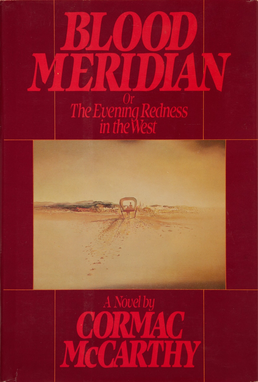Part 12
byPart 12 of Blood Meridian follows the grim and relentless journey of a group of riders through a barren, unforgiving desert landscape. For two weeks, these men travel primarily at night, deliberately avoiding any signs of their presence, such as campfires or loud noises, as they push forward with grim determination. The atmosphere surrounding their travels feels cursed, with the riders trapped in an endless pursuit across the vast emptiness, where the land offers no reprieve. Their journey unfolds against an arid backdrop, where the landscape seems to devour all traces of life, and their only sustenance comes from the pack animals they butcher. As they trek onward, the eerie sight of dust devils swirls through the air, and the full moon casts long shadows across the desolation, emphasizing the haunting isolation they face.
The days stretch on as they continue moving into even more hostile terrain, the sun’s scorching heat during the day turning into biting cold once night falls. The land offers nothing but vast stretches of dry earth, with no signs of life to indicate they are making progress. Despite their silence, the men share a common resolve, each fully aware of the path they are following and the violence that inevitably awaits them. One day, they stumble across the grim remains of a wagon train, the lifeless bodies of those who had previously attempted to make this journey scattered among the ground. The decaying corpses serve as a stark reminder of the brutality of their environment, and the riders, weary but resolute, press forward, knowing that survival requires nothing short of relentless pursuit.
A significant shift in their journey comes when they prepare to confront the Gilenos, a group camped near a lake. Glanton and the judge, the leaders of the group, adopt a plan of ambush, revealing the structured hierarchy of the riders as they organize their violent mission. The judge, a complex and enigmatic figure, further exemplifies his deep connection to this mission, and his influence over the group intensifies. His teachings and actions emphasize the brutal nature of the group, where violence is not only inevitable but necessary. Their plan to ambush the Gilenos underscores the dark path they are on and sets the tone for the bloodshed that will follow.
When the attack on the Gilenos’ village begins, it unfolds with devastating speed and brutality. The riders, without hesitation, sweep through the camp, quickly overwhelming the peaceful inhabitants with their force. Horses trample through the encampment, and the chaos that erupts is indescribable, with men and women screaming as they are caught in the onslaught. The attack is merciless and thorough, with no concern for the lives being destroyed in the process. Children, women, and the elderly fall victim to the carnage, highlighting the group’s lack of compassion for anyone who stands in their way. This violence sets the stage for the moral decay that runs throughout the narrative.
As the chaos of the massacre continues, the riders collect scalps and heads from their victims, taking trophies as a testament to their brutal victory. These actions highlight the extreme dehumanization of the group, as they no longer see their enemies as people but as mere objects to be claimed. In the aftermath, the riders’ interaction with each other further reveals the depth of their apathy and indifference to the suffering they have caused. Their brutal deeds have stripped them of any remaining humanity, and the bond between them is forged not through shared values or experiences but through a shared lust for violence.
The chapter continues with the riders moving forward despite the physical toll the journey has taken on them. Their wounds accumulate, but the group’s relentless pursuit of survival drives them onward, unwilling to turn back despite the ever-present danger. The darkness of their actions hangs over them as they push deeper into the wild, where the landscape grows more treacherous and the threat of death looms closer. The chapter builds to a crescendo, highlighting the brutal, senseless violence that shapes their world and underlining the theme of moral decay that runs throughout the narrative. As the group continues their journey, it becomes clear that they are locked in a cycle of violence, each step forward marked by brutality and an increasing loss of humanity. The haunting imagery of the desolate land and the men’s unyielding march forward paints a chilling picture of survival, where cruelty becomes the ultimate driving force.

